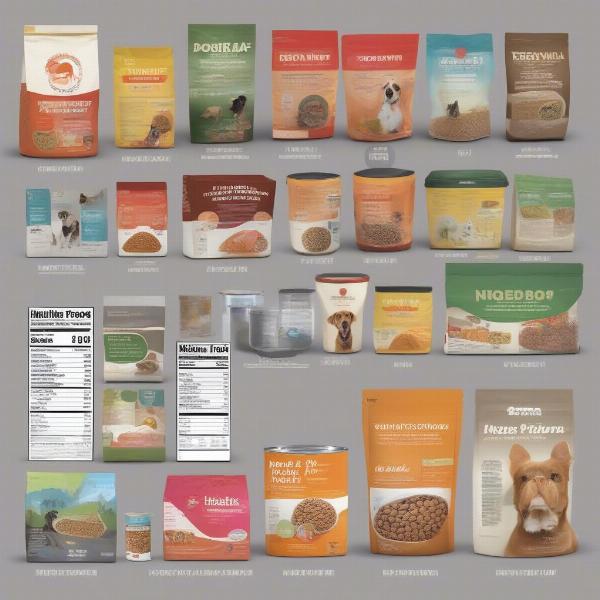“N D dog food” is a search term that likely indicates a user looking for information on dog food brands with the initials “N D.” While it’s not a widely recognized acronym in the pet food industry, we can explore potential interpretations and provide valuable information about choosing the right dog food, regardless of the brand. This article will guide you through the essential factors to consider when selecting dog food, ensuring your furry friend receives the optimal nutrition they need to thrive.
Deciphering “N D Dog Food”: What Does it Mean?
The search term “N D dog food” could refer to a specific brand, a homemade diet, or even a typo. Since there’s no established brand using this acronym, it’s crucial to focus on what matters most: the nutritional value and suitability of the dog food for your pet. Are you looking for a natural diet (ND)? Perhaps a diet for a dog with specific needs (ND)? Understanding the underlying need behind the search is key. Regardless of the meaning, choosing a complete and balanced diet is crucial for your dog’s health and well-being.
 Choosing the right dog food
Choosing the right dog food
Key Nutrients for a Healthy Diet
Whether you’re searching for “N D dog food” or any other brand, a balanced diet should contain the essential nutrients for a dog’s growth and development. These include proteins, fats, carbohydrates, vitamins, and minerals. High-quality protein sources, like meat and poultry, provide amino acids crucial for muscle building and repair. Healthy fats, such as those found in fish oil, support skin and coat health, as well as cognitive function.
Reading Dog Food Labels: A Crucial Step
Decoding dog food labels can be daunting. Look for the Association of American Feed Control Officials (AAFCO) statement, which indicates whether the food meets nutritional standards for complete and balanced nutrition. Pay attention to the ingredient list, which is listed in descending order by weight. Meat and poultry should be listed first, followed by whole grains and vegetables. Avoid fillers like corn meal and by-products.
Considering Your Dog’s Individual Needs
Every dog is unique. Factors like age, breed, activity level, and health conditions influence their nutritional requirements. Puppies need food formulated for growth, while senior dogs require a diet that supports joint health and manages age-related conditions. Active breeds benefit from higher calorie and protein content, while dogs with allergies or sensitivities require specialized formulas.
Different Types of Dog Food: Finding the Right Fit
Choosing between dry kibble, wet food, raw food, and homemade diets can be confusing. Kibble is convenient and affordable, while wet food can be more palatable for picky eaters. Raw and homemade diets require careful planning and preparation to ensure nutritional balance. low phosphorus dog food is essential for dogs with certain kidney conditions. Consider consulting a veterinarian for personalized advice on the best diet for your dog.
Avoiding Common Dog Food Mistakes
Overfeeding, feeding table scraps, and frequently switching dog food brands can lead to digestive issues and nutritional imbalances. Stick to a consistent feeding schedule and consult your veterinarian before making any significant dietary changes. is rachael ray good dog food? This is a question many dog owners ask, and careful research is important.
Is “N D Dog Food” the Right Choice?
While the specific meaning of “N D dog food” remains unclear, the principles of choosing a healthy and balanced diet remain constant. Focus on high-quality ingredients, complete and balanced nutrition, and your dog’s individual needs. no meal dog food can be a good option for dogs with allergies. Don’t hesitate to consult with your veterinarian or a certified canine nutritionist for personalized advice. is members mark dog food good? This is another brand worth researching to ensure it aligns with your dog’s needs.
Conclusion
Choosing the right dog food is a crucial aspect of responsible pet ownership. While the term “N D dog food” might not provide a clear direction, it highlights the importance of researching and selecting a diet that meets your dog’s individual needs. By prioritizing nutritional value, understanding dog food labels, and consulting with professionals, you can ensure your furry companion receives the optimal nutrition they deserve. moringa for dogs can be a beneficial supplement, but it’s essential to consult your veterinarian before adding it to your dog’s diet.
FAQ
- What does “N D dog food” stand for? The meaning is unclear, but likely refers to a specific brand or dietary need.
- What are the essential nutrients in dog food? Proteins, fats, carbohydrates, vitamins, and minerals are crucial.
- How can I tell if a dog food is balanced? Look for the AAFCO statement and scrutinize the ingredient list.
- What should I consider when choosing dog food? Age, breed, activity level, health conditions, and dietary restrictions.
- What are the different types of dog food available? Dry kibble, wet food, raw food, and homemade diets.
- How can I avoid dog food mistakes? Avoid overfeeding, table scraps, and frequent brand switching.
- Should I consult a veterinarian about my dog’s diet? Yes, a veterinarian can provide personalized recommendations.
ILM Dog is a leading international website dedicated to providing expert advice on dog care and nutrition. We offer comprehensive resources on breed selection, health care, training, nutrition, grooming, exercise, and much more. Our goal is to empower dog owners with the knowledge and tools they need to provide the best possible care for their canine companions. We specialize in offering guidance on dog breeds, health & care, training & behaviour, nutrition & feeding, grooming & hygiene, and product recommendations. Contact us for expert advice: Email: [email protected], Phone: +44 20-3965-8624. Visit ILM Dog for more information.